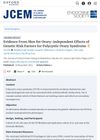Transgenerational Transmission of Reproductive and Metabolic Dysfunction in Male Progeny of Polycystic Ovary Syndrome
May 2023
in “
Cell reports medicine
”

TLDR Sons of mothers with polycystic ovary syndrome (PCOS) have a higher risk of obesity and insulin resistance, possibly due to certain genes and factors passed down from their mothers.
The study "Transgenerational transmission of reproductive and metabolic dysfunction in the male progeny of polycystic ovary syndrome" examined the effects of maternal polycystic ovary syndrome (PCOS) on male offspring. The research involved 467,275 sons born in Sweden between July 2006 and December 2015, of which 9,828 (2.10%) were born to mothers diagnosed with PCOS. The study found that these sons had a higher risk of obesity and altered lipid profiles, indicating insulin resistance. The study also identified potential microRNAs (miRNAs) that could contribute to the transmission of PCOS traits in humans. These miRNAs are involved in pathways related to insulin resistance, sex differentiation, and hormone response. The study also found that these miRNAs appear to regulate six PCOS-risk genes. The findings suggest that sons of women with PCOS may carry circulating factors that increase their susceptibility to developing PCOS traits. The study also found that maternal PCOS could induce fetal programming, predisposing not only daughters but also sons to adult disease due to an adverse maternal-fetal environment. The study strengthens the hypothesis that maternal PCOS can have transgenerational effects.





